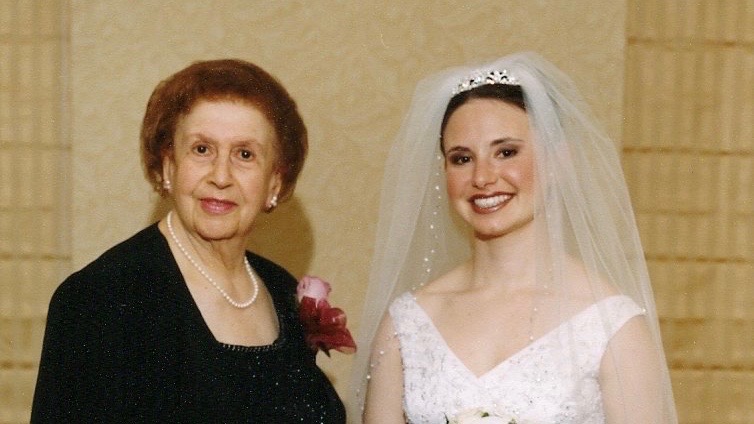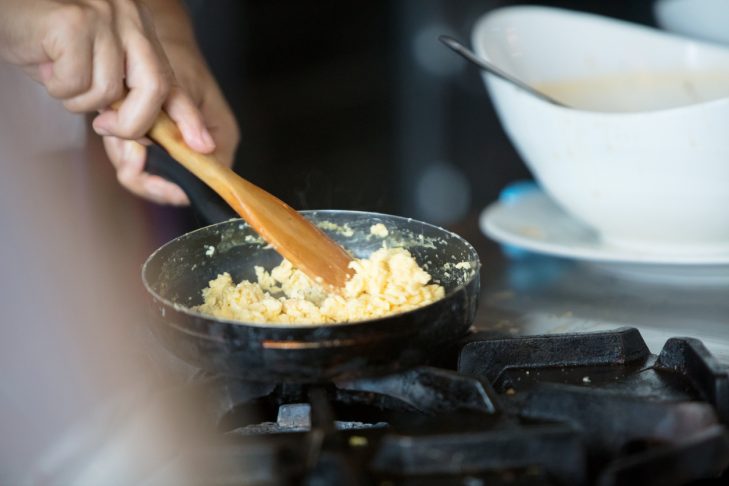Friday afternoon is a hustle and bustle of activity, a whirlwind, a race to the finish. Shabbat begins at sundown, after which no work, including cooking, is permitted. So many foods that one might prepare for Shabbat have an egg wash, from deliciously yeasty freshly braided challah, to the savory crust of a hot and bubbly chicken pot pie, to the crisp and flaky dough of puff pastry featured in a dessert. I’ve never managed to discard the egg that inevitably remains from an egg wash. I don’t like being wasteful, but it’s more than that: this egg is special. It has been my accomplice, my partner in preparing for Shabbat. How could I just unceremoniously wash it down the drain?
As a newlywed in my New York kitchen, I recall facing my leftover egg from the egg wash and thinking, “Well, there’s nothing that’s come into contact with this egg that could be harmful, so why not just fry it up, as I would any other?” I carefully extracted one of the high-quality All-Clad pans my grandmother gave us for our wedding, a set I reserve for cooking meat dishes and which otherwise rarely sees an egg, as I normally prepare eggs as part of a dairy meal. I placed the skillet on the stove and added a teaspoon of oil to the pan and a few grains of salt to the egg. Then the magic happened. The egg sizzled and cooked through in a matter of seconds, something that would never happen in my lower-quality pans I use in the preparation of dairy meals. I tasted the egg screaming hot, right out of the pan, and swooned. So, a new tradition of Friday afternoon eggs was born in my household.
Despite being unkissed by butter, no other scrambled egg ever tastes as delicious to me as this Friday afternoon one. Occasionally, I’ve offered a taste to my husband, but he doesn’t appreciate the difference. He isn’t connected to this egg, and, at this point, he has told me that he doesn’t want to deprive me of the pleasure I so clearly derive from it. Whether it’s the pan, the holiness of the whole afternoon’s endeavor, or the fact that I’ve often not taken the time to eat lunch amidst the day’s busy preparations, there is something truly magical about this egg.
I love that my grandmother chose pots and pans from the registry for our wedding present. I come from a long line of fabulous cooks, and I felt that my grandmother, a woman I love so dearly that I named my daughter after her, would always be cooking alongside me, especially during Shabbat preparations.
To my memory, my grandmother’s food repertoire was relatively small, but, boy, was she an expert at what she made. For me, it’s about that egg; but for her, it was all about the chicken: mouthwatering roast, stuffed chicken, seasoned to perfection; the richest, most full-bodied golden chicken soup; and matzo balls laden with schmaltz, or chicken fat, a recipe she rattled off to me by memory over the phone one month after I was married and just days before the heartbreaking news of her fatal diagnosis with a brain tumor. Can you imagine that? This was a recipe so ingrained in my grandmother’s being that it remained crystal clear to her, even as some aspects of the world became cloudy around her.
It is now 12 years later. As the pots and pans she gave me continue to clatter about and work a magic of their own, that life-affirming egg, my grandmother and I find a few moments of calm together amidst the storm of Shabbat preparations, between the ordinary and sacred spaces in time.

This post has been contributed by a third party. The opinions, facts and any media content are presented solely by the author, and JewishBoston assumes no responsibility for them. Want to add your voice to the conversation? Publish your own post here. MORE



